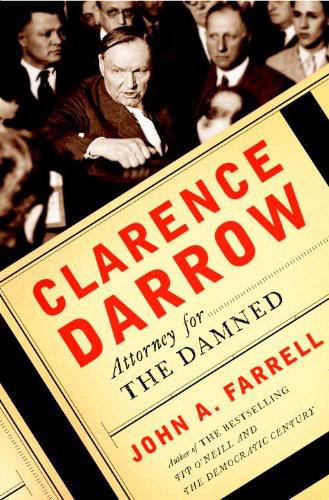
Clarence Darrow
Attorney for the Damned
کتاب های مرتبط
- اطلاعات
- نقد و بررسی
- دیدگاه کاربران
نقد و بررسی

July 11, 2011
Farrell's (Tip O'Neill and the Democratic Century) latest book is an immensely personal ode to a fearlessly progressive maverick lawyer, larger than life socialite, and fiercely independent gentleman. Darrow's financial setbacks, domestic volatility, and public scandal seem trivial when compared to his consummate performances in the dock, where his overarching articulations, witticisms, and wisdom occasionally belied deceit. Making a name for himself in a late nineteenth century Chicago plagued with crime and bloodshed, American industrialism, and the railroad boom could have set him up for life. Instead, he chose to tackle social unrest, using his intellect and eloquence in the "defense of the underdog," representing gangsters, psychopaths, and crooked politicians with miraculous, if not always just, results. Darrow was an early proponent of Civil Rights, dealing with graphic cases of related atrocities, which Farrell meticulously relays. A master of the lengthy closing argument, Darrow cited Freud and Nietzsche in his radical and dramatic courtroom speeches, none more so than the infamous Monkey Trial in which he ridiculed closed-minded religious fundamentalists in championing "academic liberty, free thought, and scientific inquiry." Though Darrow was a man who walked with kings, he never lost the common touch, and Farrell's biography finally does him justice.

Starred review from May 15, 2011
A comprehensive biography of the storied defense attorney.
At midlife, embarrassed by his comfortable railroad practice so at odds with his personal beliefs, Clarence Darrow (1857–1938) took on a series of high-profile cases whose underlying political, sociological and economic issues placed him at the white-hot center of the Progressive Era. His starring role in these courtroom dramas turned him into a legend. Making elaborate use of transcripts, observers' accounts, correspondence and newspaper reports, Farrell (Tip O'Neill and the Democratic Century, 2002) chronicles Darrow's most celebrated trials in detail: the defense of labor leaders Eugene Debs and "Big Bill" Haywood; the McNamara brothers, charged with firebombing the Los Angeles Times headquarters; homosexual thrill-killers Leopold and Loeb; Ossian Sweet, accused of murder for defending his home against a racist mob; John Scopes for teaching evolution in violation of Tennessee law; and the friends and family of Thalia Massie, on trial in Hawaii for a so-called "honor killing." These cases—including two in which Darrow, almost surely guilty, was himself tried for jury tampering—dominate the narrative, but Farrell neatly places them within the larger context of this complicated man's crowded life and practice. He covers Darrow's small-town upbringing, his brief country-lawyer career, his move to Chicago and his rise within the city's political and legal establishment. A puzzling mix of towering ego and bottomless compassion, Darrow was also an author and an in-demand lecturer who more than dabbled in politics. Also at home within bohemian circles, Darrow preferred the company of artists, professors and poets. (Edgar Lee Masters, who grew to despise him, was for a time his legal partner.) Twice-married, Darrow was also an inveterate womanizer, money grubber and shameless self-promoter who often bent the ethical code to combat what he saw as corrupt prosecutions. Farrell unflinchingly addresses these shortcomings, even as he underscores the genuine brilliance of a still-unmatched advocate for underdogs everywhere.
A warts-and-all portrait that leaves readers lamenting Darrow's private failings, while still in awe of his immensely consequential career.
(COPYRIGHT (2011) KIRKUS REVIEWS/NIELSEN BUSINESS MEDIA, INC. ALL RIGHTS RESERVED.)

June 15, 2011
A brilliant legal strategist and dynamic courtroom attorney, Clarence Darrow is best remembered for his defense of union leader Eugene Debs in the 1894 Pullman Strike case, the 1924 Leopold-Loeb murder case, and the Scopes "monkey trial" a year later. In this new biography, Farrell (senior writer, Ctr. for Public Integrity in Washington; Tip O'Neill and the Democratic Century) claims to be a "loving revisionist" and the first to use recently released, previously unpublished Darrow correspondence to create a more accurate portrait of this complex individual. While there has been no shortage of Darrow biographies over the years, most either focus on his trials or paint him as a folk hero, glossing over or omitting his divorce, numerous affairs, and financial woes, all of which are covered in Farrell's well-researched and compelling book. VERDICT Like Andrew E. Kersten's Clarence Darrow: American Iconoclast, published in April and also boasting access to new primary materials, this book succeeds in presenting Darrow in the fuller context of his life. Here is an American legal icon who deserves two new definitive biographies. Highly recommended.--Leslie Lewis, Duquesne Univ. Lib., Pittsburgh
Copyright 2011 Library Journal, LLC Used with permission.

Starred review from June 1, 2011
Darrow was a man of rough charisma, skilled in courtroom argument, often troubled in his personal life, and complicated in his political philosophies but generally meriting his reputation as an iconic progressive hero. Farrell (Tip O'Neill and the Democratic Century, 2001) presents Darrow as an egotist and idealist, a man of impressive physical presence and eloquence in the courtroom as well as out and about in the bawdy world of Chicago politics during the Gilded Age. He was among the power brokers but was an iconoclast attracted to cases and causes on behalf of civil liberties. Best known for his defenses of socialite thrill killers Leopold and Loeb and of evolution teacher John Scopes, Darrow mixed doses of philosophy and poetry with the law in his closing arguments in those and many other cases. But Darrow was not above the occasional ethnically questionable tactic, particularly in his own trial for bribery. Farrell offers excerpts from Darrow's magnificent courtroom arguments as well as delicious details of his personal life (he was a hearty participant in the era's free love movement). Farrell gleans from previously undisclosed material to offer a completely engaging portrait of a flawed man of noble ideals.(Reprinted with permission of Booklist, copyright 2011, American Library Association.)

























دیدگاه کاربران